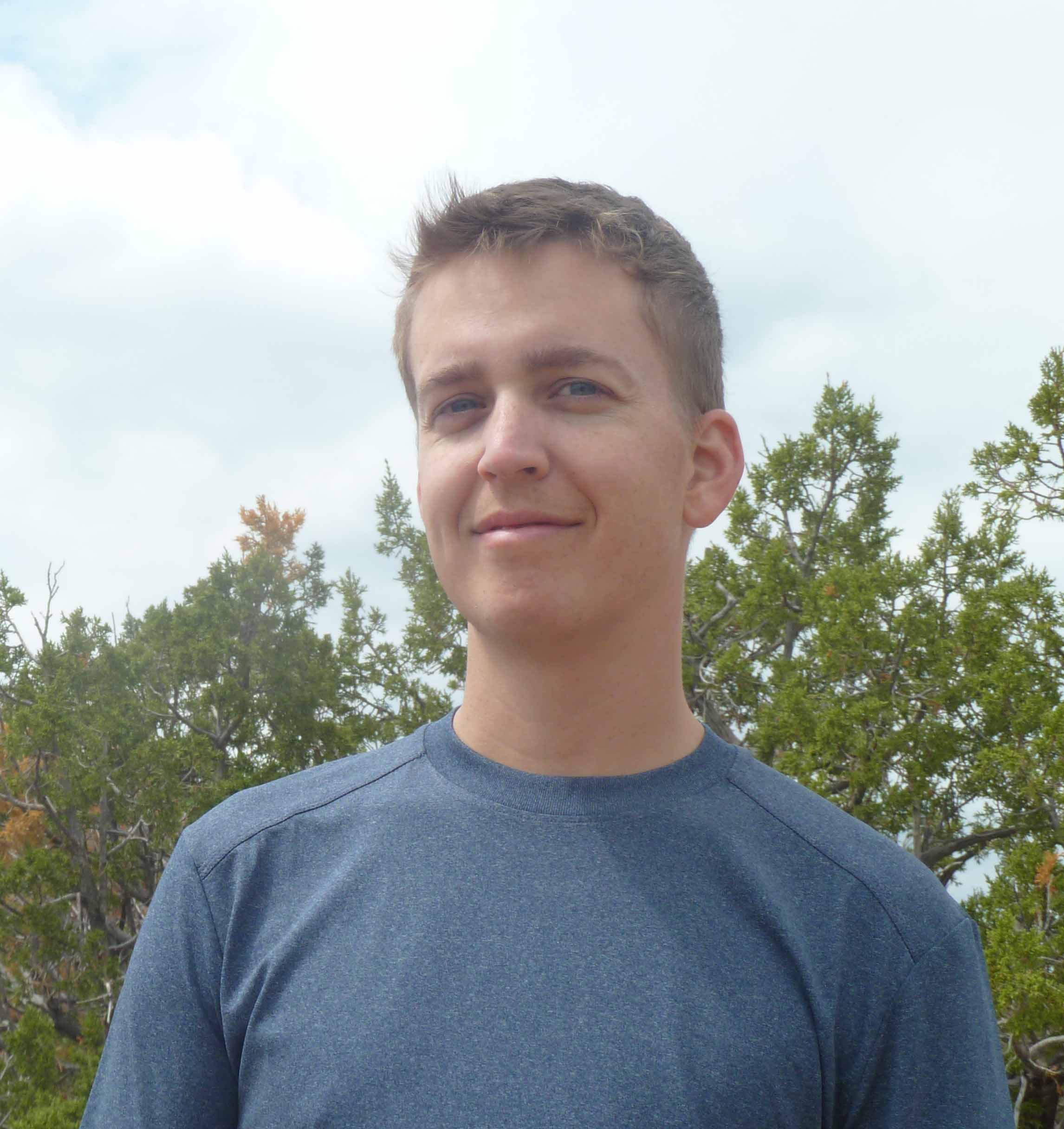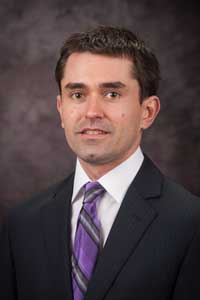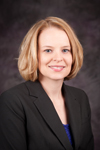Building research capacity in Kansas involves many tactics, one of which is bolstering the talent of it's young, up-and-coming university faculty members. This is what the Kansas NSF EPSCoR (KNE) First Award program does.
Each year KNE solicits transformational research proposals from early-career faculty members at Kansas' Regents Universities. These newly appointed assistant professors are eager to begin their research programs with funding from the National Science Foundation (NSF) or other federal funding agencies. KNE helps by jump starting their research with a First Award that will hopefully lead to a successful NSF proposal.
This year, KNE awarded nine First Awards in the areas of Climate and Energy research.

Our Children's Grasslands: Understanding Present and Predicting Future Diversity of Dominant Great Plains Grasses
James Beck, Assistant Professor, Biological Sciences, Wichita State University
Despite their immense value (forage, biofuel, ecosystem services) and vulnerability to climate change, we currently lack even a basic picture of how genetic diversity is arrayed across Great Plains grasslands. The proposed research has two main goals: 1) document genomic and cytological diversity across the ranges of ten dominant Great Plains grass species by analyzing DNA extracted from thousands of museum specimens; and 2) predict potential loss of such diversity under numerous climate change scenarios. Critically, our novel use of museum DNA eliminates the need for extremely time consuming fieldwork, allowing us to understand the genetics of these species at an unprecedented depth and scale. This work has clear relevance to the KNE Climate Change and Energy initiative. Specifically, its combination of cutting-edge genomic and climate modeling techniques to predict the effects of climate change on grassland genetic resources sits squarely within the Climate Change and Mitigation sub-project.

Experimental and Modeling Analysis of CO2 as a Control on Microbial Activity in Anoxic Environments
Matthew Kirk
, Assistant Professor, Geology, Kansas State University
The objective of the research is to test the hypothesis that an increase in CO2 abundance can stimulate microbial iron reduction, leading to a decrease in the rate of sulfate reduction or methanogenesis, where those groups compete with iron reducers for electron donors. Results from a preliminary set of experiments are consistent with the hypothesis (Kirk et al., 2013); additional experiments and numerical modeling are needed to examine sulfate-deficient systems, the sensitivity of the relationships, and mechanisms.
The proposed research is related to climate change. In response to warming, rates of organic matter degradation are expected to increase in many soils, elevating the flux of CO2 into the subsurface. Geochemical evidence indicates that this effect is already occurring, including a study at the Konza Prairie. Understanding how this increase will affect subsurface microbiology is important because microbial populations strongly influence water quality and carbon storage in the subsurface.
 New Solid Polymer Electrolyte Materials for Next Generation Lithium Batteries
New Solid Polymer Electrolyte Materials for Next Generation Lithium Batteries
Bin Li, Assistant Professor, Mechanical Engineering, Wichita State University
Solid polymer electrolytes (SPEs) are ideal replacement of prevailing liquid dominated electrolytes for new generation lithium batteries (LBs), due to superior stability and safety, and sufficient mechanical strength of polymers. Meanwhile, their excellent shapability and conformability promise the development of energy and electronic devices with complex 3D configurations.
The proposed research will attempt to resolve two critical issues of current SPEs, that is, low room temperature ionic conductivity and high SPE/electrode interfacial resistance, by means of recent successful synthesis of novel imide polymers by PI.
The new polymers possess several advantages which do not commonly exist in reported SPEs: (1) simultaneously high density of hetero elements and amorphous structures for high ionic conductivity; (2) remarkably high modulus and good adhesion with electrodes, which are essential to low interfacial resistance and high interfacial stability, suggesting their great potential as SPE hosts for high efficiency and reliable energy applications of LBs
 Trustworthy and Privacy-Preserving Data Management in Smart Grid
Trustworthy and Privacy-Preserving Data Management in Smart Grid
Fengjun Li, Assistant Professor, Electrical Engineering & Computer Science, University of Kansas
Smart grid is identified as the national science and engineering grand challenge areas in the United States. It integrates existing power grids with modern information infrastructure to achieve “smart” generation, distribution, management and consumption of electric power. Two critical SG components are Advanced Metering Infrastructure (AMI) for two-way connectivity and smart grid applications such as demand-response and outage management that utilize the real-time metering data for “smart” management and control. However, data collection and management are often considered as two orthogonal processes where raw meter data measurements using different information models are collected in various AMIs and then processed at the meter data management systems (MDMSs) to support upper-layer applications. This not only results in inefficient data collection but also faces various security and privacy problems intrinsic in AMI data collection (e.g., false data injection, consumer data privacy, etc.) To tackle the problems, I propose to develop a comprehensive data collection and management framework to integrate trustworthy and privacy-preserving data collection in AMIs and efficient data management for smart grid applications. The proposed project will include a series of cryptographic techniques for data confidentiality and authentication, outlier detection and distributed incremental verification, privacy-preserving data aggregation, and adaptive data collection based on user privacy attribute configuration.
 Determination of the molecular structures of Cu/Fe-modified ZSM-5 catalysts for methane-to-methanol conversions from first-principles method
Determination of the molecular structures of Cu/Fe-modified ZSM-5 catalysts for methane-to-methanol conversions from first-principles method
Bin Liu, Assistant Professor, Chemical Engineering, Kansas State University
This study is motivated by the development of an alternative more energy efficient methanol production process utilizing the abundant natural gas resource and the Cu/Fe modified ZSM-5 catalyst to replace the current two-step reaction pathways. The investigation will be carried out from a theoretical perspective using first-principles calculations. The detailed molecular modeling shall examine several key factors that is believed to govern the zeolites catalytic properties relevant to methane oxidation: (1) the geometry of the active sites, (2) the metal ion oxidation state, (3) size and shape effects of zeolite cavities, and (4) thermodynamics/kinetics of methane oxidation pathways. The broader impact of this modeling study will help: (i) design novel catalyst materials tailored for active and selective methane oxidation and (ii) offer insight in alternative solutions to produce chemicals in more energy efficient and environmental friendly manner.
 Investigating the CO2 Exchange in a Tall-Grass Prairie Ecosystem using an Analytical Lagrangian Dispersion Analysis and Stable Isotopes
Investigating the CO2 Exchange in a Tall-Grass Prairie Ecosystem using an Analytical Lagrangian Dispersion Analysis and Stable Isotopes
Eduardo Santos, Assistant Professor, Agronomy, Kansas State University
A better understanding of the biophysical mechanisms controlling soil and plant CO2 exchange in ecosystems is needed to improve our current knowledge of the carbon cycle and predictions of future climate scenarios. Stable isotopes of carbon and oxygen (13CO2 and C18OO) are powerful tools for studying the exchange of CO2 between land and the atmosphere across a range of spatial scales (from single-leaf to global scales). New optical sensors have allowed continuous and accurate stable isotope atmospheric concentration measurements under field conditions. These measurements can be combined with existing micrometeorological techniques to study gas exchange at the ecosystem scale. I propose the use of a novel approach that combines an analytical Lagrangian dispersion analysis and concentration profiles of stable isotopes in the air for determining isotope signatures of soil and plant flux components and partitioning the contributions of soil and plants to the CO2 flux in a tall-grass prairie ecosystem.
 Towards Energy Efficient Learning and Adaptation in Cognitive Radio Wireless Networks
Towards Energy Efficient Learning and Adaptation in Cognitive Radio Wireless Networks
Yi Song, Assistant Professor, Electrical Engineering and Computer Science, Wichita State University
The research objective of this proposal is to design, analyze, and evaluate an energy-efficient learning and adaptation framework for cognitive radio networks (CRNs). Cognitive radio has recently emerged as a promising technology to overcome the imbalance between the increase in spectrum access demand and the inefficiency in spectrum usage. A “cognitive radio” is a radio that can change its transmitter parameters to opportunistically exploit the unused spectrum without causing harmful interference to incumbent users. Learning and adaptation capabilities are the two distinct features of CR devices to detect the unused spectrum and adjust the transmitter parameters based on the learning information. These two capabilities are crucial for the success of CRNs. However, both the learning and adaptation operations are energy intensive, and can quickly drain the batteries of CR devices if not managed efficiently. This issue is currently unexplored in the literature and requires significant research efforts to save energy.
 Integrated Process Development for Protein and Oil Recovery from Microalgae Biomass
Integrated Process Development for Protein and Oil Recovery from Microalgae Biomass
Lisa R. Wilken, Assistant Professor, Biological and Agricultural Engineering, Kansas State University
The goal of the proposed research is to design an integrated process for protein and oil fractionation to reduce costs of bioenergy production. Aqueous enzymatic oil extraction (AEOE), a non-solvent and environmentally friendly method, will be developed to co-extract oil and protein from microalgae biomass. AEOE uses mild processing conditions that preserve protein activity and functionality necessary for sustainable food and pharmaceutical applications. Critical process parameters that will be investigated include enzyme classes and activities, dosage, incubation conditions, and protein/oil separation and refining methods. In the future, the integrated process is expected to be applicable to metabolically- and genetically-engineered biomass.
 Microbial mechanisms of drought tolerance and the implications for grassland soil carbon storage
Microbial mechanisms of drought tolerance and the implications for grassland soil carbon storage
Lydia Zeglin, Assistant Professor, Division of Biology, Kansas State University
In Kansas grassland soils, after periods of drying, soil microbiota exhibit multiple strategies of response to rainfall that support greater soil C storage. These strategies include decreased carbon dioxide efflux, decreased enzymatic potential for soil organic matter decomposition and increased microbial C use efficiency. However, it is not clear which subset of cells mediates these shifts in situ, how widespread these strategies are (including prevalence in grazed or cultivated soils), or whether these climate-soil feedbacks are mediated by plant responses. This project will evaluate the distribution and operation of microbial drought tolerance mechanisms in Kansas grassland soils with contrasting plant communities, moisture regimes and management histories. Many soil microbes are well-adapted to drought; however the severity of drought events is predicted to increase in Great Plains grasslands. Data from this project will help define the potential for grassland soil C sequestration under future climate change and land management scenarios.
To learn about past KNE First Awardees please visit
http://www.nsfepscor.ku.edu/first-awards-yr4.html
















.jpg)


